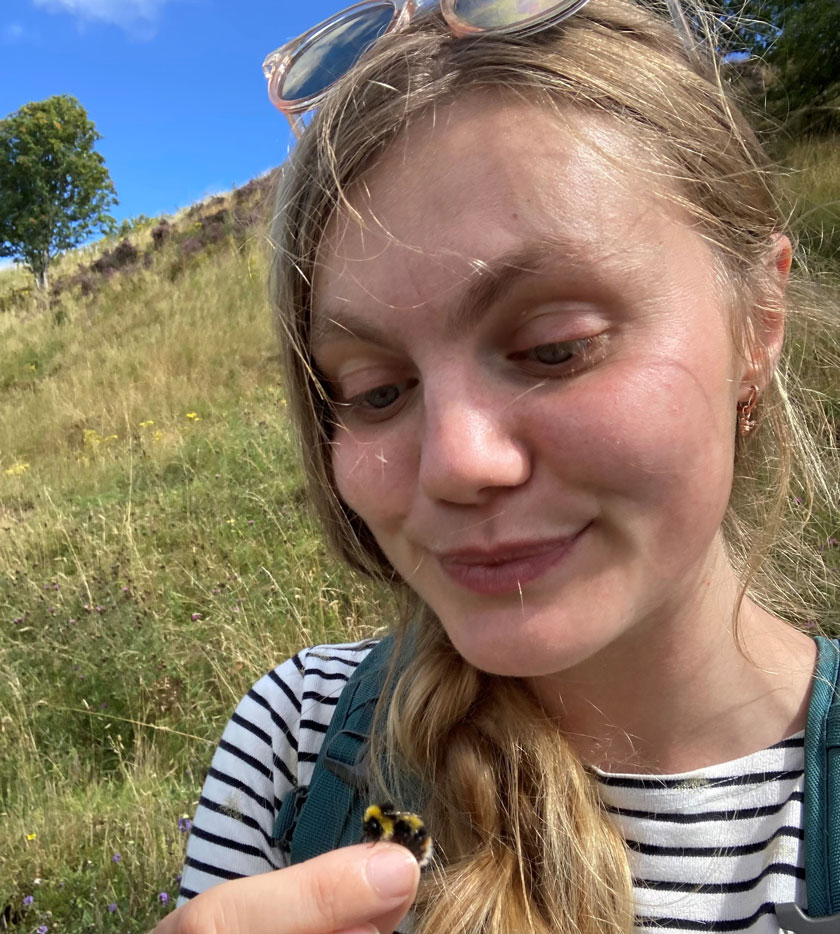Charlotte Rankin, a Conservation Officer at Buglife, shares how funding from the ScottishPower Foundation is helping to save pollinating insects.

I’m Charlotte, a Conservation Officer at Buglife. Originally from North East England, I have recently moved from the Tyne to the Tweed area.
I’ve worked on several pollinator-focused projects, including a bee citizen-science project in North East England and a grassland restoration project in Cumbria. I’m looking forward to telling you more about our current project Pollinators Along the Tweed and the work I do in a typical day. A day in the life at Buglife if you like!
Pollinators Along the Tweed is focused on reversing the decline of pollinating insects, like bees and flies, which pollinate many of our crops and wildflowers, enabling us to produce food to eat. They also provide diversity to our ecosystem and contribute an estimated £43 million in value per year for agricultural and horticultural crops, so they are worth saving!
The support and funding from the ScottishPower Foundation is essential to the delivery of Pollinators Along the Tweed. Sadly our pollinating insect populations are rapidly declining, because over 97% of their feeding and nesting habitat has been lost since the 1930s. Working with local authorities, landowners, and communities across 50 sites in towns and villages along the Tweed, as well as the wider countryside, our aim is to create, enhance and restore at least 40 hectares of wildflower-rich grassland and other flower-rich habitat over the course of four and a half years to ensure future generations can share in these benefits.
The Foundation’s support will also facilitate the creation of a flower-rich habitat for pollinators. enabling them to move across the landscape and adapt to a changing environment, plus we’ll be getting local communities involved through practical conservation volunteering, pollinator identification workshops and walks, citizen science and community events, and more.
Their contribution also helps communities create and manage their local area for pollinators in the long term, raising awareness and inspiring future action for pollinators.
My role is to work with communities, landowners and volunteers to create and manage pollinator habitats along the River Tweed and provide opportunities to learn about the diversity and importance of insect pollinators. This ranges from meeting land managers and planning habitat enhancements, to producing educational resources and organising events.
A typical day for me may involve:
9am – 10am: I check emails with a morning coffee and prepare for a site visit with a project partner. This may involve producing site maps and background reading on the location, its habitats and usage.
11am – 1pm: I then head off to meet the land manager on site. We usually explore and discuss opportunities for habitat enhancements and events, and how Pollinators Along the Tweed can support the partners’ aspirations for the site.
When the weather is a bit more forgiving, the morning or afternoon may be spent outdoors with communities at project sites delivering habitat enhancements including sowing wildflower seed, building a bee bank, or planting wildflowers. In the summer, we will be out in search of pollinating insects together on walks, workshops, and citizen-science training events.
2pm – 3pm: My afternoons typically involve a meeting. On Tuesday afternoons, there is a Buglife weekly team catch-up where we all share updates on our work across the UK as well as share and discuss ideas.
3pm – 4pm: Following a site visit, I typically write up notes and start to produce a site opportunities plan. This involves mapping areas identified during the visit, planning habitat enhancements such as meadow creation and bee bank creation and developing a work programme.
4pm – 5pm: My day usually winds down by replying to emails and planning for the week ahead, including scheduling meetings and further site visit preparation.
Readers may also be interested in finding out more about the wider Destination Tweed programme of which Pollinators Along the Tweed forms part of, involving a range of cultural, river and landscape projects along the River Tweed: tweedforum.org/our-work/projects/destination-tweed/.
Explore Buglife’s work across Scotland on our website and follow us on Twitter for updates on our projects. You can also email scotland@buglife.org.uk to receive a quarterly newsletter that shares updates on exciting new stories, events, talks and volunteering opportunities north of the border.